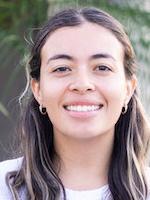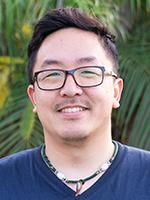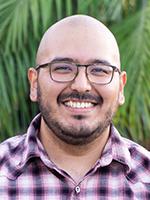

Computational Thinking Playground: Engaging in the Equity and Integration of CT |
Participate and share : Playground
Leila Firestone Sarah FitzHenry Hansol Hong Wes Hsu Dr. Marci Klein Alycia Meier Arnold Suarez Alicia Verweij Kerri Wilder Heidi Williams
Discover tools needed to integrate data and algorithms into core content instruction. Join us on a computational thinking journey that will have you playing and contributing to a shared computational artifact.
| Audience: | Coaches, Library media specialists, Teachers |
| Skill level: | Beginner |
| Attendee devices: | Devices useful |
| Attendee device specification: | Smartphone: Android, iOS, Windows Laptop: Chromebook, Mac, PC Tablet: Android, iOS |
| Participant accounts, software and other materials: | None |
| Topic: | Computer science & computational thinking |
| Grade level: | PK-12 |
| Subject area: | Computer science, STEM/STEAM |
| ISTE Standards: | For Educators: Designer
|
| Additional detail: | Student presentation, ISTE author presentation |
| Related exhibitors: | Robolink |
Participants will experience computational thinking by engaging in hands-on activities and stations that walk them through each step of the CT process. The CT problem will be: How can we create playground equipment that is accessible to all children?
There will also be a station that focuses specifically on 'digging into the data.' Educators can participate in classroom drone activities that integrate CT and the science of biomes. They will be using the drone sensor data to look for patterns and abstract generalizations.
Station #1: Decomposition: Work with cardboard cutouts to decompose the 'buckets' that will help to analyze the current inequities in playgrounds.
Station #2: Patterns & Abstractions: Dig deeper in the character traits of children. Here you will design your own cardboard character profile.
Station #3: Algorithms: Take your character with you and design a playground adaptation/modification for him/her/them by creating an algorithm that will automate the equipment.
Station #4: Flipgrid - Share your work and enter into a book drawing.
Station #5: Extend your learning by 'Digging Deeper into the Data!' Have fun exploring environments and habitats using drones to collect data.
ISTE - Computational Thinking Competencies (https://www.iste.org/standards/iste-standards-for-computational-thinking)
ISTE - Student Standard 1.5: Computational Thinker (https://www.iste.org/standards/iste-standards-for-students)

Leila started at Robolink as a robotics and programming instructor. Now, she develops the software and curriculum for Robolink's educational drones. Leila tests and develops drone activities that teach students programming and computational thinking skills. She has seen both sides of STEM education being both a student and an instructor. Her goal is to make programming education accessible, exciting, and relevant.

Sarah FitzHenry is an educator working to provide equitable and engaging educational experiences for all students. As the Learning and Community Manager for BirdBrain Technologies, she connects, supports, and empowers educators all over the world as they bring creative robotics into their classrooms. Sarah is a tech geek, maker, writer, volunteer, and co-host of the Once Upon a Tech podcast. A Jane-of-all-trades, she can be found in Charlottesville, Virginia making mistakes, learning new things, and asking a lot of questions.Sarah FitzHenry is an educator working to provide equitable and engaging educational experiences for all students. As the Learning and Community Manager for BirdBrain Technologies, she connects, supports, and empowers educators all over the world as they bring creative robotics into their classrooms. Sarah is a tech geek, maker, writer, volunteer, and co-host of the Once Upon a Tech podcast. A Jane-of-all-trades, she can be found in Charlottesville, Virginia making mistakes, learning new things, and asking a lot of questions.

Hansol, is CEO and Co-founder of Robolink. He and the Robolink team have taught over 20,000 students how to build robots and program drones. He also ran five successful Crowdfunding campaigns (CoDrone EDU, Zumi, CoDrone Pro, Buildy Bots, Rokit Smart), and over 2,000 schools across the world are using Robolink’s kits. He is also an organizer for the San Diego Robotics Club, with 1700+ members. Hansol graduated from UC San Diego with the degree in Management Science, B.S.

Wesley Hsu is the Chief Product Officer at Robolink. Robolink makes robotics kits for classrooms to learn about engineering and coding principles. Wes is in charge of understanding what needs teachers and users have, and how those needs translate into features for the robotics kits and the curriculum. Their latest product is a programmable drone designed for the classroom.

Marci Klein M.D. is an NYU trained clinical and academic pediatrician with over 20 years experience in early childhood development, education and social/emotional heath. She transitioned into education 4 years ago, joining her two teen children, the original founders of 3DuxDesign cardboard modeling system after seeing the incredible response from both educators and students, Dr. Klein now creates a wide range project-based learning resources for children learning both in the classroom and at home. Her curriculum focuses on real-world problem solving, blending the arts with traditional STEM education to inspire the next generation of innovators.

Alycia Meier is Robolink's Director of Operations. Specializing in early childhood education, educational operations, and instructional design for electrical engineering and robotics, Alycia has over 13 years experience in tech education. With her educational outreach, she has launched two all-girls tech programs, and managed tech programs and camps. An instructional designer, Alycia has written over 20 tech curriculums ranging from electrical engineering with Arduino, and LEGO Mindstorms, to autonomous vehicles, and used her expertise to design curriculum pedagogy's and style-guides. A long-life maker, Alycia is always finding new ways to make learning fun!

Arnold Suarez is a hardware engineer at Robolink and has worked in robotics and education for 6 years. He designs and tests the hardware for Robolink’s educational robot kits. Arnold is also an experienced instructor. His experience teaching after-school programs helps him improve the software and hardware for students and teachers to have the best experience.

Alicia Verweij is a seasoned educator, passionate about teaching children to think critically, problem-solve, and function in an ever-changing digital world in preparation for future careers. She is committed to collaborative, engaging learning techniques and assisting educators in implementing them. As a teaching veteran, she holds a Master of Education in Educational Leadership, a B.S. in Business Management, an Alternate Route Education Certification, and an endorsement in Gifted Education. Over the course of her career, she has been the recipient of numerous grants and awards based on her success in the classroom.

Kerri Wilder has 25 years of elementary and secondary experience in Mississippi public schools as a teacher, professional development coordinator, and as an administrator. Holds a Master’s degree in Educational Leadership, a Bachelor of Science in Education with a specialty in Upper Elementary, and additional licensure endorsements in 7-8 Science, K-12 English, and Psychometry. As a seasoned, experienced educator, she is known for her perspective and innovation for solving problems. She has mentored numerous educators and administrators. Kerri’s passion for education is focused on creating schools that everyone wants to be a part of and she has done so quite successfully.

Heidi Williams is a passionate coding and computational thinking advocate. She has over 30 years of experience in K-12 public education as both a teacher and administrator. She currently serves as a computer science curriculum specialist for Marquette University's PUMP CS grant in Milwaukee, WI. Williams has shared her passion for integrating coding and computational thinking into the curriculum at local, state, regional and national conferences, and many have leveraged her expertise for conference presentations, coding coaching, professional development and K-12 scope and sequence alignment of computer science skills throughout the curriculum (nofearcoding.org)
Foster inclusive classrooms with Microsoft 365
Introduction to Micro:bit With MakeCode